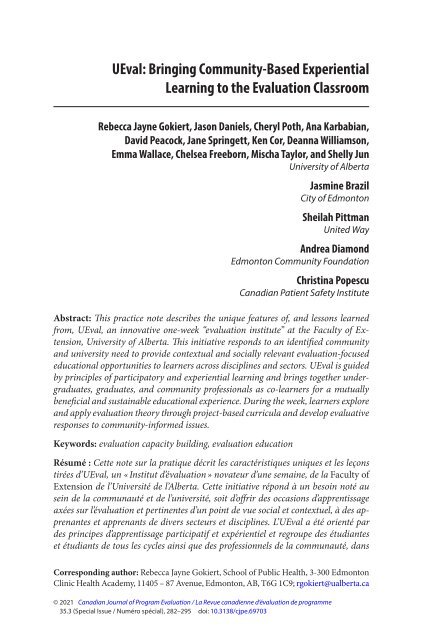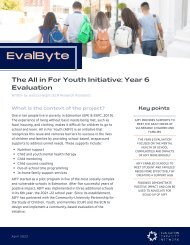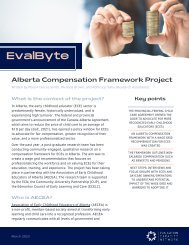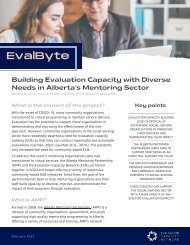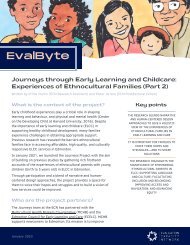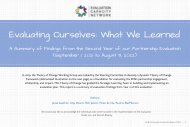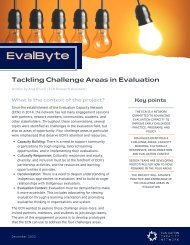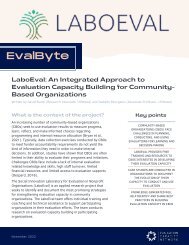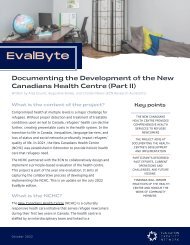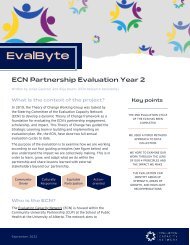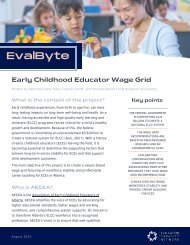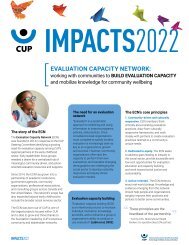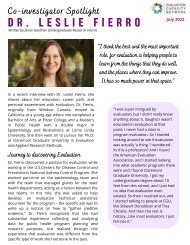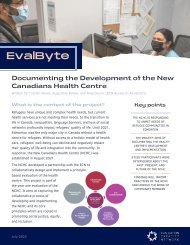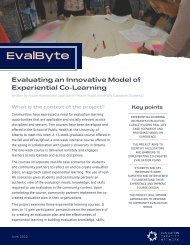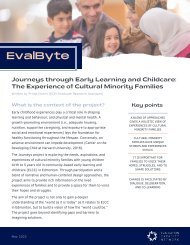UEval: Bringing Community-Based Experiential Learning to the Evaluation Classroom
You also want an ePaper? Increase the reach of your titles
YUMPU automatically turns print PDFs into web optimized ePapers that Google loves.
<strong>UEval</strong>: <strong>Bringing</strong> <strong>Community</strong>-<strong>Based</strong> <strong>Experiential</strong><br />
<strong>Learning</strong> <strong>to</strong> <strong>the</strong> <strong>Evaluation</strong> <strong>Classroom</strong><br />
Rebecca Jayne Gokiert, Jason Daniels, Cheryl Poth, Ana Karbabian,<br />
David Peacock, Jane Springett, Ken Cor, Deanna Williamson,<br />
Emma Wallace, Chelsea Freeborn, Mischa Taylor, and Shelly Jun<br />
University of Alberta<br />
Jasmine Brazil<br />
City of Edmon<strong>to</strong>n<br />
Sheilah Pittman<br />
United Way<br />
Andrea Diamond<br />
Edmon<strong>to</strong>n <strong>Community</strong> Foundation<br />
Christina Popescu<br />
Canadian Patient Safety Institute<br />
Abstract: This practice note describes <strong>the</strong> unique features of, and lessons learned<br />
from, <strong>UEval</strong>, an innovative one-week “evaluation institute” at <strong>the</strong> Faculty of Extension,<br />
University of Alberta. This initiative responds <strong>to</strong> an identified community<br />
and university need <strong>to</strong> provide contextual and socially relevant evaluation-focused<br />
educational opportunities <strong>to</strong> learners across disciplines and sec<strong>to</strong>rs. <strong>UEval</strong> is guided<br />
by principles of participa<strong>to</strong>ry and experiential learning and brings <strong>to</strong>ge<strong>the</strong>r undergraduates,<br />
graduates, and community professionals as co-learners for a mutually<br />
beneficial and sustainable educational experience. During <strong>the</strong> week, learners explore<br />
and apply evaluation <strong>the</strong>ory through project-based curricula and develop evaluative<br />
responses <strong>to</strong> community-informed issues.<br />
Keywords: evaluation capacity building, evaluation education<br />
Résumé : Cette note sur la pratique décrit les caractéristiques uniques et les leçons<br />
tirées d’<strong>UEval</strong>, un « Institut d’évaluation » novateur d’une semaine, de la Faculty of<br />
Extension de l’Université de l’Alberta. Cette initiative répond à un besoin noté au<br />
sein de la communauté et de l’université, soit d’offrir des occasions d’apprentissage<br />
axées sur l’évaluation et pertinentes d’un point de vue social et contextuel, à des apprenantes<br />
et apprenants de divers secteurs et disciplines. L’<strong>UEval</strong> a été orienté par<br />
des principes d’apprentissage participatif et expérientiel et regroupe des étudiantes<br />
et étudiants de <strong>to</strong>us les cycles ainsi que des professionnels de la communauté, dans<br />
Corresponding author: Rebecca Jayne Gokiert, School of Public Health, 3-300 Edmon<strong>to</strong>n<br />
Clinic Health Academy, 11405 – 87 Avenue, Edmon<strong>to</strong>n, AB, T6G 1C9; rgokiert@ualberta.ca<br />
© 2021 Canadian Journal of Program <strong>Evaluation</strong> / La Revue canadienne d’évaluation de programme<br />
35.3 (Special Issue / Numéro spécial), 282–295 doi: 10.3138/cjpe.69703
<strong>UEval</strong>: <strong>Community</strong>-<strong>Based</strong> <strong>Experiential</strong> <strong>Learning</strong> 283<br />
le cadre d’une expérience pédagogique durable et mutuellement bénéfique. Au cours<br />
de la semaine, les apprenantes et apprenants explorent et appliquent la théorie de<br />
l’évaluation par l’intermédiaire d’un curriculum fondé sur des projets et élaborent<br />
des réponses d’évaluation à des questions d’ordre communautaire.<br />
Mots clés : amélioration de la capacité d’évaluation, formation en évaluation<br />
Increasing pressures on community-based organizations <strong>to</strong> generate evidence of<br />
accountability and impact parallel a rising demand for evaluation education. Universities<br />
have a pivotal role in training and building <strong>the</strong> capacity of both working<br />
professionals and students entering <strong>the</strong> workforce <strong>to</strong> respond <strong>to</strong> society’s evaluative<br />
needs (McShane et al., 2015). In Canada, <strong>the</strong>re is a lack of evaluation-focused<br />
higher-level education (Hunter & McDavid, 2018) that equips students with practical<br />
and contextual evaluation knowledge and skills (Gokiert et al., 2017). This<br />
is problematic; evaluation is used extensively across sec<strong>to</strong>rs <strong>to</strong> measure program<br />
and policy effectiveness, and it is in great demand by government, non-profits,<br />
and businesses.<br />
This practice note describes <strong>UEval</strong>, an innovative, one-week evaluation institute<br />
at <strong>the</strong> University of Alberta that bridges evaluation <strong>the</strong>ory and practice <strong>to</strong><br />
fill a community and university evaluation gap by bringing stakeholders <strong>to</strong>ge<strong>the</strong>r<br />
around community-based experiential learning. In addition <strong>to</strong> course learnings,<br />
<strong>UEval</strong> serves <strong>to</strong> build sustainable evaluation capacity through a shared<br />
learning space for undergraduate, graduate, and community learners. Through<br />
community-informed case-based learning and learner co-creation of evaluation<br />
plans, <strong>UEval</strong> supports community stakeholders by providing <strong>the</strong>m with a tangible<br />
evaluation resource.<br />
EVALUATOR TRAINING<br />
Evalua<strong>to</strong>r training can increase evaluation capacity and prepare competent practitioners<br />
(Gullickson et al., 2019; Johnson, 2018; LaVelle, 2019). <strong>UEval</strong> was created<br />
<strong>to</strong> foster competency gains through its competency-based curriculum and experiential,<br />
co-learning teaching model. Integrating <strong>the</strong>se pedagogical approaches,<br />
<strong>UEval</strong> aims <strong>to</strong> build reciprocally beneficial evaluation capacity within <strong>the</strong> university<br />
and <strong>the</strong> community. Professional competency gains can also be explained as<br />
evaluation capacity building (ECB), or gains in knowledge, skills, and attitude on<br />
how <strong>to</strong> conduct and use evaluations (Labin, 2014; Preskill & Boyle, 2008; Rogers<br />
et al., 2019). Gokiert et al. (2017) identified needs for evaluation capacity at<br />
both individual and organizational levels within <strong>the</strong> social sec<strong>to</strong>r—specifically in<br />
<strong>the</strong> form of innovative learning opportunities <strong>to</strong> cultivate contextual evaluation<br />
knowledge and skills. Although recent literature provides examples of learning<br />
opportunities with experiential, co-learning teaching models, similar <strong>to</strong> <strong>UEval</strong><br />
(Bakken et al., 2014; Mignone et al., 2018; Suiter et al., 2016), few studies describe<br />
competency-based course-models (Poth et al., 2020). Competency gains<br />
in practical and contextual domains prepare evalua<strong>to</strong>rs for effective professional<br />
doi: 10.3138/cjpe.69703<br />
CJPE 35.3, 282–295 © 2021
284 Gokiert, Daniels, Poth, et al.<br />
practice in community contexts (Gokiert et al., 2017). While existing training<br />
models equip learners with technical knowledge, many programs are not designed<br />
<strong>to</strong> nurture <strong>the</strong> knowledge, skills, and dispositions with which learners can apply<br />
evaluation <strong>the</strong>ory in practice (Davis & MacKay, 2014 ; Dewey et al., 2008; Galport<br />
& Azzam, 2017; Johnson, 2018).<br />
Hands-on, experiential teaching and co-learning enhance learner engagement<br />
in evaluation training (Boyce & McGowan, 2019; Darabi, 2002; Kaye-<br />
Tzadok & Spiro, 2016; Oliver et al., 2008). Students learn course concepts through<br />
problem solving with applied contexts and real-life cases (Oliver et al., 2008; Suiter<br />
et al., 2016). The instruc<strong>to</strong>r’s role becomes that of facilita<strong>to</strong>r and fellow co-crea<strong>to</strong>r<br />
(Bhola, 1998). Problem-focused learning and facilitation empower students <strong>to</strong><br />
think through <strong>the</strong>ir decisions, while encouraging <strong>the</strong>m <strong>to</strong> seek <strong>the</strong> instruc<strong>to</strong>r’s<br />
guidance or expertise when needed (Oliver et al., 2008). The result is a more active<br />
and reflective role of learners (Darabi, 2002; Suiter et al., 2016).<br />
<strong>UEval</strong>’s constructivist pedagogy informs its experiential, co-learning teaching<br />
model, allowing peers <strong>to</strong> learn from and with one ano<strong>the</strong>r, with <strong>the</strong> goal of<br />
constructing new knowledge and applying it <strong>to</strong> <strong>the</strong>ir context (Bhola, 1998; Buckley<br />
et al., 2015). Co-learning emphasizes an egalitarian learning partnership that<br />
equally values <strong>the</strong> input of all participants (Bhola, 1998; Farnsworth et al., 2016).<br />
The co-learning process enhances learning because it relies on <strong>the</strong> collective responsibility<br />
of learners in knowledge co-construction and application (Bhola, 1998;<br />
Buckley et al., 2015) as “interdependent co-learners and co-investiga<strong>to</strong>rs” (Suiter et<br />
al., 2016, p. 553). This practice note outlines how <strong>UEval</strong>’s constructivist pedagogy<br />
informs its co-created curriculum and addresses <strong>the</strong> call for fur<strong>the</strong>r research about<br />
<strong>the</strong> significance of pedagogy in informing evalua<strong>to</strong>r education (LaVelle, 2020).<br />
<strong>UEval</strong> BACKGROUND AND CONTEXT<br />
Prior <strong>to</strong> <strong>the</strong> genesis of <strong>UEval</strong>, several of <strong>the</strong> authors conducted an evaluation<br />
capacity needs assessment in Alberta (Tink et al., 2017), finding that universities<br />
have a pivotal role in increasing <strong>the</strong> evaluation capacity of <strong>the</strong> health and<br />
social sec<strong>to</strong>r by providing evaluation-based expertise, brokering student capacity<br />
through practicums, and providing education for university students (McDavid &<br />
Devine, 2009; McShane et al., 2015). Students are eager <strong>to</strong> build new skills and<br />
are seeking community-based research, evaluation, and learning opportunities<br />
(Gokiert et al., 2017; Mignone et al., 2018). They recognize <strong>the</strong> need <strong>to</strong> equip<br />
<strong>the</strong>mselves with contextual knowledge and skills <strong>to</strong> navigate a social sec<strong>to</strong>r with<br />
complex challenges (Armitage & Levac, 2015; Porter et al., 2018).<br />
Responding <strong>to</strong> <strong>the</strong>se findings, we formed a partnership among faculty, students,<br />
funders, and community stakeholders who recognized <strong>the</strong> need <strong>to</strong> bridge<br />
gaps in community and university evaluation. We received funding through a<br />
University of Alberta Teaching and <strong>Learning</strong> Enhancement Grant <strong>to</strong> develop<br />
and pilot a one-week evaluation institute in spring 2019. We formed a <strong>Learning</strong><br />
Advisory Committee (LAC) with stakeholders able <strong>to</strong> represent <strong>UEval</strong>’s diverse<br />
learner needs and guide its development. LAC representation, drawn from <strong>the</strong><br />
© 2021 CJPE 35.3, 282–295 doi: 10.3138/cjpe.69703
<strong>UEval</strong>: <strong>Community</strong>-<strong>Based</strong> <strong>Experiential</strong> <strong>Learning</strong> 285<br />
partnership, included campus faculty (Public Health, Pharmacy, <strong>Community</strong> Service<br />
<strong>Learning</strong>, Education, Human Ecology, Extension), a municipal government<br />
body (City of Edmon<strong>to</strong>n), two community funders (United Way of <strong>the</strong> Capital<br />
Region, Edmon<strong>to</strong>n <strong>Community</strong> Foundation), and <strong>the</strong> Alberta/Northwest Terri<strong>to</strong>ries<br />
chapter of <strong>the</strong> Canadian <strong>Evaluation</strong> Society (CES).<br />
To learn from a similar experiential, constructivist model of teaching and<br />
learning, Gokiert and three students (two graduate and one undergraduate)<br />
participated in <strong>the</strong> Summer Institute in Program <strong>Evaluation</strong> at <strong>the</strong> University of<br />
Mani<strong>to</strong>ba (Mignone et al., 2018). As learners, facilita<strong>to</strong>rs, lecturers, and observers,<br />
<strong>the</strong>y explored <strong>the</strong> Institute’s evaluation education model, real-life evaluation<br />
plans in a one-room school , and determined its feasibility and application within<br />
<strong>the</strong> Alberta context. <strong>UEval</strong> was designed as a case-based experiential, co-learning<br />
space for evaluation training. From June 3–7, 2019, <strong>UEval</strong> was piloted as a threecredit<br />
undergraduate, graduate, and non-credit continuing and professional education<br />
course. Co-instructed by authors Gokiert and Daniels, <strong>the</strong> course engaged<br />
52 learners from across seven faculties, 15 disciplines, and 13 community-based<br />
organizations. Prior <strong>to</strong> <strong>the</strong> one week of in-class sessions, learners completed four<br />
online modules covering <strong>the</strong> fundamentals of evaluation and providing a foundational<br />
understanding of evaluation language and <strong>the</strong>ory. During <strong>the</strong> in-class<br />
sessions, learners explored and applied evaluation <strong>the</strong>ory through case-based<br />
curricula. The institute instruction involved a mix of didactic lectures alongside<br />
experiential activities in <strong>the</strong> mornings and facilitated case-study group work in<br />
<strong>the</strong> afternoons (see Figure 1). Seven local community case studies informed <strong>the</strong><br />
case-study group work and provided learners <strong>the</strong> opportunity <strong>to</strong> develop tailored<br />
evaluation plans with case-study key informants. Below, we elaborate on four key<br />
elements of <strong>UEval</strong>’s instructional model that were critical <strong>to</strong> its development and<br />
delivery.<br />
Co-constructed curriculum<br />
As <strong>UEval</strong> was intended <strong>to</strong> foster university and community-engaged evaluative<br />
learning, <strong>the</strong> LAC was tasked with <strong>UEval</strong>’s development, and members are included<br />
here as authors. We met monthly <strong>to</strong> develop course objectives and online<br />
and in-class curricula, and <strong>to</strong> select relevant community case studies for <strong>the</strong> week<br />
of <strong>the</strong> institute. We engaged graduate students as research and teaching assistants<br />
<strong>to</strong> support <strong>the</strong> LAC and co-instruc<strong>to</strong>rs (Gokiert and Daniels) in <strong>UEval</strong>’s development<br />
and implementation, and we made every effort <strong>to</strong> construct <strong>the</strong> curriculum<br />
with CES competencies (2018) in mind, including CES representatives on <strong>the</strong><br />
advisory committee, and choosing pre-/post-course assessments that included<br />
<strong>the</strong>se competencies. We received ethics approval from <strong>the</strong> University of Alberta<br />
ethics board <strong>to</strong> study <strong>the</strong> development and pilot delivery of <strong>UEval</strong>.<br />
Blended and experiential learning<br />
Following a “flipped” blended delivery approach, <strong>UEval</strong> provided online instruction<br />
two weeks prior <strong>to</strong> <strong>the</strong> in-class sessions. Learners accessed online instruction<br />
doi: 10.3138/cjpe.69703<br />
CJPE 35.3, 282–295 © 2021
286 Gokiert, Daniels, Poth, et al.<br />
Figure 1 . <strong>UEval</strong> Institute at a glance<br />
© 2021 CJPE 35.3, 282–295 doi: 10.3138/cjpe.69703
<strong>UEval</strong>: <strong>Community</strong>-<strong>Based</strong> <strong>Experiential</strong> <strong>Learning</strong> 287<br />
through e-class, a Moodle learning service, which offered a downloadable library<br />
of resources <strong>to</strong> inform class assignments or practice, along with interactive modules<br />
. Online modules were hosted on ISeazy, a web-based platform, and were accessible<br />
any time during <strong>the</strong> two weeks. Our goal was <strong>to</strong> provide content <strong>to</strong> build<br />
technical and foundational evaluation knowledge. As one learner shared, “[<strong>the</strong><br />
modules] created somewhat of a level ‘playing field’ for <strong>the</strong> practical in-class work,<br />
which I thought was fantastic!” Upon completing each module, learners could<br />
test <strong>the</strong>ir newly acquired knowledge through quizzes and engage with peers in<br />
discussion forums.<br />
<strong>UEval</strong>’s blended and condensed format is innovative in offering a flexible<br />
learning structure that accommodates busy community partners and university<br />
students. Equally, <strong>UEval</strong>’s model of experiential, co-learning is unique; ra<strong>the</strong>r than<br />
students going in<strong>to</strong> <strong>the</strong> community for practicums or community service-learning,<br />
<strong>UEval</strong> brings <strong>the</strong> community <strong>to</strong> <strong>the</strong> classroom. <strong>UEval</strong> engaged community members<br />
as learners, and many brought cases from <strong>the</strong>ir organizations for co-learning<br />
and co-creation alongside students. In <strong>the</strong> mornings, <strong>the</strong> co-instruc<strong>to</strong>rs delivered<br />
lectures complementing <strong>the</strong> pre-institute online modules and prepared learners<br />
for <strong>the</strong>ir case-study activities. <strong>Experiential</strong> learning exercises followed; in preassigned<br />
groups, students co-constructed knowledge, sharing ideas of how lecture<br />
content applied <strong>to</strong> a local, multi-stakeholder illustrative case study used throughout<br />
<strong>the</strong> week.<br />
Case-study group work in <strong>the</strong> afternoons allowed learners <strong>to</strong> collaboratively<br />
test and apply what <strong>the</strong>y had learned. Students and community partners explored<br />
and co-created evaluation plans for seven different community-based case studies.<br />
Each learner was pre-assigned <strong>to</strong> a group based on <strong>the</strong> relevance of <strong>the</strong>ir<br />
academic or professional background <strong>to</strong> <strong>the</strong> <strong>to</strong>pic, and groups included about<br />
eight participants—learners, key informant(s), and a facilita<strong>to</strong>r. To help commence<br />
discussion, each group received a two-page handout detailing program his<strong>to</strong>ry,<br />
objective(s), and evaluation need/rationale. A learners’ handbook included<br />
instructions, activities, and questions <strong>to</strong> guide discussions and ensure that key<br />
evaluation plan elements were addressed. At week’s end, each group presented<br />
an evaluation framework, with guests invited from <strong>the</strong> community. Facilita<strong>to</strong>rs<br />
were integral <strong>to</strong> <strong>the</strong> case-study group work, encouraging equitable participation,<br />
mediating interpersonal conflicts, and providing evaluation men<strong>to</strong>rship. They<br />
were selected on merits of teaching or facilitating experience, as well as working<br />
knowledge of evaluation concepts. All facilita<strong>to</strong>rs participated in a one-day training<br />
workshop <strong>to</strong> discuss <strong>the</strong> case-study documents, student handbook, pro<strong>to</strong>cols<br />
for team development, conflict resolution, and learner expectations.<br />
Interdisciplinary and intersec<strong>to</strong>ral learners<br />
Fifty-two learners participated in <strong>UEval</strong>: 17 community learners, 31 university<br />
students, and four audi<strong>to</strong>rs. To recruit learners, weekly advertisements for<br />
prospective students and community partners were placed in diverse media,<br />
including university newsletters, listservs, and newsletters of local community<br />
organizations, and through <strong>the</strong> wider professional community, such as <strong>the</strong> CES.<br />
doi: 10.3138/cjpe.69703<br />
CJPE 35.3, 282–295 © 2021
288 Gokiert, Daniels, Poth, et al.<br />
We also employed social media posts and a short video on university TV moni<strong>to</strong>rs.<br />
Students included four undergraduate and 27 graduate students, <strong>the</strong> majority<br />
of whom were Master’s level, from across seven faculties and 15 disciplines on<br />
campus. <strong>Community</strong> learners represented local community-based organizations<br />
from <strong>the</strong> public and private sec<strong>to</strong>rs, and many participated with <strong>the</strong> dual role of<br />
learner and key informant <strong>to</strong> a case study.<br />
Case study <strong>to</strong>pics varied widely and included campus food security, early<br />
literacy, early childhood development, public washrooms, and care of seniors. A<br />
call for submissions was circulated through multiple intersec<strong>to</strong>ral social network<br />
and media platforms. Interested organizations submitted an online interest form<br />
and were expected <strong>to</strong> send a key informant <strong>to</strong> participate, should <strong>the</strong>ir case study<br />
be accepted, <strong>to</strong> answer specific questions about <strong>the</strong> case’s context.<br />
<strong>UEval</strong> learning evidence<br />
<strong>UEval</strong> learners completed several graded assessments, and assignments <strong>to</strong> promote<br />
dialogue and reflection were woven in<strong>to</strong> <strong>the</strong> course. Survey results from<br />
<strong>the</strong> beginning and end of <strong>the</strong> course indicated increased CES competency gains.<br />
Learners also completed individual final reflections on <strong>the</strong> learning experience,<br />
including CES competencies, major course learnings, and <strong>the</strong> group process.<br />
Many concluded that <strong>the</strong>y became cognizant of how little <strong>the</strong>y knew about evaluation.<br />
As one learner stated, “until hearing <strong>the</strong> importance of <strong>the</strong>se competencies<br />
in <strong>the</strong> lectures and group work, I didn’t realize <strong>the</strong>re was a lot I still needed <strong>to</strong><br />
learn.” Learners identified diversity as an opportunity for <strong>the</strong>m <strong>to</strong> garner alternate/<br />
holistic perspectives from <strong>the</strong>ir intersec<strong>to</strong>ral and interdisciplinary peers:<br />
In learning from individuals in different fields, we come <strong>to</strong> better see <strong>the</strong> interconnectedness<br />
of issues and <strong>the</strong> impacts on systems and communities as a whole, ra<strong>the</strong>r<br />
than in isolation. Through engaging with colleagues from a variety of sec<strong>to</strong>rs, it opens<br />
up new ways of analyzing complex problems and <strong>the</strong> possibility for solutions <strong>to</strong> <strong>the</strong>se<br />
complex problems. The opportunity <strong>to</strong> connect and learn from each o<strong>the</strong>r from our<br />
various positions . . . was an invaluable part of this course.<br />
On <strong>the</strong> institute’s last day, each case study group gave a 20-minute presentation<br />
of its evaluation plan. A small grade weight was allotted <strong>to</strong> anonymized peer<br />
assessments of <strong>the</strong>se presentations. The course culminated in <strong>the</strong> final evaluation<br />
plan. Learners were allowed <strong>to</strong> modify <strong>the</strong> collective work of <strong>the</strong>ir case-study<br />
group when writing <strong>the</strong> plan individually or in smaller groups. In addition <strong>to</strong> serving<br />
as an assessment <strong>to</strong>ol, <strong>the</strong> final plan was a valuable product for <strong>the</strong> community<br />
partners and organizations that planned <strong>to</strong> conduct evaluations in <strong>the</strong> near future.<br />
These evaluation plans, with data-collection methods and schedules, knowledge<br />
translation strategies, and helpful resources for implementation, constituted a<br />
significant starting place for organizations <strong>to</strong> begin <strong>the</strong>ir own evaluations.<br />
The diversity of learners and worldviews contributed <strong>to</strong> <strong>the</strong> knowledge gained<br />
during training and shaped how students engaged in co-learning and consensus<br />
building. Co-construction of <strong>the</strong> final evaluation framework included <strong>the</strong> challenging<br />
task of arriving at consensus with peers and <strong>the</strong> key informant. In contrast<br />
© 2021 CJPE 35.3, 282–295 doi: 10.3138/cjpe.69703
<strong>UEval</strong>: <strong>Community</strong>-<strong>Based</strong> <strong>Experiential</strong> <strong>Learning</strong> 289<br />
<strong>to</strong> case-based evaluation courses where learners have time <strong>to</strong> process information<br />
about <strong>the</strong> program after meeting <strong>the</strong> stakeholder, <strong>UEval</strong> learners had both <strong>the</strong><br />
benefit and challenge of conversing with <strong>the</strong> key informant in class and quickly<br />
making decisions. Discussions and brains<strong>to</strong>rming—core activities of consensus<br />
building—required that learners reconcile and negotiate diverse ideas while remaining<br />
respectful.<br />
REFLECTION<br />
We reflect on our learnings, and share <strong>UEval</strong>’s pedagogy, strengths and challenges,<br />
with <strong>the</strong> hope that o<strong>the</strong>r educa<strong>to</strong>rs may be able <strong>to</strong> implement similar initiatives.<br />
With anticipated future deliveries of <strong>UEval</strong>, reflection is also important for improving<br />
<strong>the</strong> course.<br />
Co-constructed curriculum<br />
The LAC’s community − university engaged process for course development ensured<br />
that <strong>the</strong> curriculum was relevant across different disciplines and sec<strong>to</strong>rs, and<br />
<strong>the</strong> collaboration of diverse stakeholders ensured that <strong>the</strong> course’s content aligned<br />
with its constructivist pedagogy. <strong>UEval</strong> will continue <strong>to</strong> include a co-creation process:<br />
among LAC stakeholders for course content, and among learners during <strong>the</strong><br />
institute. In a move that addressed <strong>the</strong> LAC concern that <strong>the</strong> course be beneficial<br />
and accessible <strong>to</strong> community organizations and learners, funding opportunities<br />
were provided <strong>to</strong> offset tuition costs.<br />
Blended and experiential co-learning<br />
The goal of <strong>the</strong> pre-institute online learning was <strong>to</strong> introduce foundational evaluation<br />
concepts, allowing more classroom time for instruction, experiential learning,<br />
and co-creation. We directed <strong>the</strong> online module content <strong>to</strong> learners from a<br />
variety of academic backgrounds and exposure levels <strong>to</strong> evaluation. Some learners<br />
who had not recently been in school or who had not taken a methods course<br />
found <strong>the</strong> materials more challenging and <strong>to</strong>ok longer than <strong>the</strong> anticipated one<br />
hour <strong>to</strong> complete each module. Learners also expected that instruc<strong>to</strong>rs would<br />
reiterate module content during <strong>the</strong> institute. Conversely, instruc<strong>to</strong>rs added depth<br />
<strong>to</strong> <strong>the</strong> online modules through a series of experiential activities in class and <strong>the</strong><br />
opportunity <strong>to</strong> participate in <strong>the</strong> real-life case study. In future institutes we plan<br />
<strong>to</strong> reiterate some module content—without reproducing it—before starting <strong>the</strong><br />
experiential exercises.<br />
The modules also provided a virtual space for an online community of practice.<br />
Learners expected instruc<strong>to</strong>rs <strong>to</strong> moderate <strong>the</strong> online forum discussions,<br />
which was not feasible. To address this, we will host live sessions with instruc<strong>to</strong>rs,<br />
providing needed instructional feedback for learners.<br />
Though not without its problems, <strong>the</strong> blended learning did enable us <strong>to</strong> offer<br />
<strong>the</strong> institute with just one week of in-class time, making it accessible for learners<br />
who cannot afford a longer time commitment.<br />
doi: 10.3138/cjpe.69703<br />
CJPE 35.3, 282–295 © 2021
290 Gokiert, Daniels, Poth, et al.<br />
The case-study team activities served as a microcosm of a complex community<br />
context and offered a significant opportunity <strong>to</strong> see evaluation unfold in real<br />
life. As <strong>the</strong> case-based learning required team interactions and consensus building<br />
with strangers of varying experiences and motivations for taking <strong>the</strong> course,<br />
it created challenging interpersonal dynamics. Facilita<strong>to</strong>rs needed <strong>to</strong> appreciate<br />
<strong>the</strong> intricate nature of <strong>the</strong> activity and resolve interpersonal challenges and conflicts<br />
while guiding group collaboration. Though facilita<strong>to</strong>rs had subject-matter<br />
expertise in evaluation, <strong>the</strong>ir main role was <strong>to</strong> navigate group dynamics and keep<br />
<strong>the</strong> teams moving forward.<br />
Future training will equip facilita<strong>to</strong>rs with scripted statements about respecting<br />
group process in group decision making, and we will encourage <strong>the</strong>m <strong>to</strong> communicate<br />
explicitly about <strong>the</strong>ir role as guides <strong>to</strong>, and co-crea<strong>to</strong>rs of, <strong>the</strong> case-study<br />
team, ra<strong>the</strong>r than as subject-matter experts. In a constructivist-informed classroom,<br />
knowledge co-creation is <strong>the</strong> responsibility of everyone: learners, facilita<strong>to</strong>rs,<br />
and key informants. Facilita<strong>to</strong>rs do need <strong>to</strong> know when <strong>to</strong> interject <strong>to</strong> prevent disengagement,<br />
power dynamics, or inactivity among learners and <strong>the</strong> key informant.<br />
Lastly, introducing <strong>the</strong> case-study group <strong>to</strong> one ano<strong>the</strong>r and <strong>to</strong> <strong>the</strong> key informant<br />
prior <strong>to</strong> class time can build camaraderie and help prevent interpersonal struggles.<br />
Intersec<strong>to</strong>ral and interdisciplinary teaching and learning<br />
In alignment with its constructivist pedagogy and addressing <strong>the</strong> needs of diverse<br />
learners, <strong>UEval</strong> departed from <strong>the</strong> “sage-on-<strong>the</strong>-stage” instruc<strong>to</strong>r model <strong>to</strong> allow<br />
students <strong>to</strong> learn from two co-instruc<strong>to</strong>rs, five facilita<strong>to</strong>rs, a CES representative,<br />
and four guest speakers. Students reported this diversity of expertise and teaching<br />
styles as a course highlight. <strong>UEval</strong> enrollment fostered constructivist ways of<br />
learning—learning from and with each o<strong>the</strong>r. <strong>Evaluation</strong> skill levels varied highly,<br />
and <strong>the</strong> intersec<strong>to</strong>ral community partners represented a wide variety of not-forprofit<br />
and public sec<strong>to</strong>rs. This is crucial, since varied skills, experiences, and perspectives<br />
are needed for meaningful group discussions and learning experiences,<br />
and it was made possible by <strong>the</strong> absence of a course prerequisite. This also meant<br />
that among <strong>the</strong> large number of learners were some who possessed minimal or no<br />
prior knowledge of evaluation; this might have rendered co-learning daunting for<br />
individuals and teammates. In <strong>the</strong> future, reducing <strong>the</strong> number of students may<br />
help address this.<br />
Alongside co-learning, some students engaged in professional networking,<br />
sharing contacts for future student volunteering, practicums, and/or <strong>the</strong>sis projects.<br />
<strong>UEval</strong> learning evidence<br />
Learner assessments provided ample opportunity for individual and group reflection.<br />
Final presentations enabled learners <strong>to</strong> demonstrate <strong>the</strong>ir new evaluative<br />
competencies <strong>to</strong> colleagues, facilita<strong>to</strong>rs, and instruc<strong>to</strong>rs. Peer assessments<br />
allowed learners <strong>to</strong> reflect on <strong>the</strong> work <strong>the</strong>y had co-created and gave <strong>the</strong>m a<br />
collectivist, constructivist mindset. All learners completed <strong>the</strong> pre- and post-CES<br />
© 2021 CJPE 35.3, 282–295 doi: 10.3138/cjpe.69703
<strong>UEval</strong>: <strong>Community</strong>-<strong>Based</strong> <strong>Experiential</strong> <strong>Learning</strong> 291<br />
competencies questionnaires, which provided an opportunity <strong>to</strong> reflect on how<br />
<strong>the</strong>ir course learnings related <strong>to</strong> CES competencies. The individual reflection<br />
assignment required learners <strong>to</strong> discuss two altered competencies. While some<br />
learners talked about gains, especially in technical and interpersonal domains,<br />
many reflected on unanticipated decreases in competency. This was a function of<br />
recognizing that <strong>the</strong>y had initially overstated <strong>the</strong>ir competencies and now had a<br />
more realistic view, reflecting a deeper appreciation for <strong>the</strong> nuances of evaluation.<br />
The reflection also asked students <strong>to</strong> comment on <strong>the</strong>ir key learnings and experiences<br />
in <strong>the</strong> group process.<br />
<strong>UEval</strong> also provided <strong>the</strong> opportunity for self-directed learning and group<br />
work, with students given two weeks after <strong>the</strong> institute <strong>to</strong> reflect on whe<strong>the</strong>r and<br />
how <strong>to</strong> revisit <strong>the</strong>ir group’s plan as <strong>the</strong>y prepared <strong>the</strong>ir final assignments. This assessment<br />
also benefited <strong>the</strong> community partners, as <strong>the</strong>y received a few versions<br />
of <strong>the</strong> final plan with ample and relevant information.<br />
A final, significant legacy of <strong>UEval</strong> is learner participation in a community of<br />
practice of like-minded individuals seeking evalua<strong>to</strong>r training.<br />
CONCLUSION<br />
We have described <strong>the</strong> pilot of a community-engaged evaluation institute that<br />
integrated competency-based curriculum with an experiential, co-learning teaching<br />
model. <strong>UEval</strong> brought community members and <strong>the</strong>ir community-informed<br />
cases in<strong>to</strong> <strong>the</strong> university classroom <strong>to</strong> foster collaborative and mutually beneficial<br />
learning that would not have been achieved o<strong>the</strong>rwise. When university and community<br />
members meet <strong>to</strong> co-learn around community-based cases, beyond disciplinary<br />
and sec<strong>to</strong>rial boundaries, <strong>the</strong>y bring diverse perspectives about complex<br />
problems. Results indicate <strong>the</strong> success of <strong>the</strong> <strong>UEval</strong> model in enhancing perceived<br />
learner competency gains, which will prepare <strong>the</strong>m for effective professional practice<br />
and build <strong>the</strong>ir evaluation capacity. Reinforcing <strong>the</strong> teaching model of <strong>UEval</strong><br />
as relevant and useful <strong>to</strong> evalua<strong>to</strong>r education, recent scholarship emphasizes <strong>the</strong><br />
benefits of competency-based evalua<strong>to</strong>r education (Poth et al., 2020) and highlights<br />
<strong>the</strong> significance of practical and contextual competency gains (Garcia &<br />
Stevahn, 2020). Ongoing research about <strong>UEval</strong> will support <strong>the</strong> refinement of<br />
this evolving model and contribute <strong>to</strong> <strong>the</strong> sparse literature on evalua<strong>to</strong>r education<br />
based on empirical evidence (King & Ayoo, 2020). This model can be employed<br />
in teaching contexts and disciplines beyond evaluation, such as psychology, nutrition,<br />
and allied health, which can benefit from an experiential component <strong>to</strong> help<br />
learners understand concepts more fully.<br />
REFERENCES<br />
Armitage, T., & Levac, L. (2015). The development of community-engaged scholars through<br />
course-based learning: A student perspective. Engaged Scholar Journal: <strong>Community</strong>-<br />
Engaged Research, Teaching and <strong>Learning</strong> , 7 (1), 148–163. https://doi.org/10.15402/<br />
esj.v1i1.25<br />
doi: 10.3138/cjpe.69703<br />
CJPE 35.3, 282–295 © 2021
292 Gokiert, Daniels, Poth, et al.<br />
Bakken, L. L., Núñez, J., & Couture, C. (2014). A course model for building evaluation capacity<br />
through a university-community partnership. American Journal of <strong>Evaluation</strong> ,<br />
35 (4), 579–593. https://doi.org/10.1177/1098214014523671<br />
Bhola, H. S. (1998). Constructivist capacity building and systemic evaluation of adult basic<br />
education and training in South Africa: One discourse, two scripts. <strong>Evaluation</strong> , 4 (3),<br />
329–50. https://doi.org/10.1177/13563899822208635<br />
Boyce, A. S., & McGowan, B. L. (2019). An exploration of two novice evaluation educa<strong>to</strong>rs’<br />
experiences developing and implementing introduction <strong>to</strong> evaluation courses. American<br />
Journal of <strong>Evaluation</strong> , 40 (1), 119–136. https://doi.org/10.1177/1098214018778812<br />
Buckley, J., Archibald, T., Hargraves, M., & Trochim, W. M. (2015). Defining and teaching<br />
evaluative thinking: Insights from research on critical thinking. American Journal of<br />
<strong>Evaluation</strong> , 36 (3), 375–388. https://doi.org/10.1177/1098214015581706<br />
Canadian <strong>Evaluation</strong> Society (CES). (2018). Competencies for Canadian evaluation practice .<br />
https://evaluationcanada.ca/txt/2_competencies_cdn_evaluation_practice.pdf<br />
Darabi, A. (2002). Teaching program evaluation: Using a systems approach. American<br />
Journal of <strong>Evaluation</strong> , 23 (2), 219–228. https://doi.org/10.1177/109821400202300211<br />
Davis, R. S., & MacKay, K. (2014). Evalua<strong>to</strong>r training: Content and <strong>to</strong>pic valuation in university<br />
evaluation courses. American Journal of <strong>Evaluation</strong> , 35 (3), 419–429. https://doi.<br />
org/10.1177/1098214013520066<br />
Dewey, J. D., Montrosse, B. E., Schröter, D. C., Sullins, C. D., & Mat<strong>to</strong>x, J. R., II. (2008).<br />
Evalua<strong>to</strong>r competencies: What’s taught versus what’s sought. American Journal of<br />
<strong>Evaluation</strong> , 29 , 268–287. https://doi.org/10.1177/1098214008321152<br />
Farnsworth, V., Kleanthous, I., & Wenger-Trayner, E. (2016). Communities of practice as<br />
a social <strong>the</strong>ory of learning: A conversation with Etienne Wenger. British Journal of<br />
Educational Studies , 64 (2), 139–160. https://doi.org/10.1080/00071005.2015.1133799<br />
Galport, N., & Azzam, T. (2017). Evalua<strong>to</strong>r training needs and competencies: A gap<br />
analysis. American Journal of <strong>Evaluation</strong> , 38 (1), 1–21. https://doi.org/10.1177/109<br />
8214016643183<br />
Garcia, G. L., Stevahn, L. (2020). Situational awareness and interpersonal competence as<br />
evalua<strong>to</strong>r competencies. American Journal of <strong>Evaluation</strong> , 41 (1), 107–124. https://doi.<br />
org/10.1177/1098214018814941<br />
Gokiert, R. J., Kingsley, B. C., Poth, C., Edwards, K., El Hassar, B., Tink, L. N., Tremblay,<br />
M., Cor, K., Springett, J., & Hopkins, S. (2017). Developing an evaluation capacity<br />
building network in <strong>the</strong> field of early childhood development. Engaged Scholar Journal:<br />
<strong>Community</strong>-Engaged Research, Teaching, and <strong>Learning</strong> , 3 (2), 59–79. https://doi.<br />
org/10.15402/esj.v3i2.333<br />
Gullickson, A. M., King, J. A., LaVelle, J. M., & Clin<strong>to</strong>n, J. M. (2019). The current state of<br />
evalua<strong>to</strong>r education: A situation analysis and call <strong>to</strong> action. <strong>Evaluation</strong> and Program<br />
Planning , 75 , 20–30. https://doi.org/10.1016/j.evalprogplan.2019.02.012<br />
Hunter, M. T., & McDavid, J. C. (2018). 2018 inven<strong>to</strong>ry of Canadian graduate evaluation<br />
education . Consortium of Universities for <strong>Evaluation</strong> Education. http://evaluation<br />
education.ca/wp-content/uploads/2018/10/Inven<strong>to</strong>ry_Full_Canadian_Graduate_<br />
<strong>Evaluation</strong>_Education_July-2018.pdf<br />
© 2021 CJPE 35.3, 282–295 doi: 10.3138/cjpe.69703
<strong>UEval</strong>: <strong>Community</strong>-<strong>Based</strong> <strong>Experiential</strong> <strong>Learning</strong> 293<br />
Johnson, S. M. (2018). The development and use of interpersonal competencies by evalua<strong>to</strong>rs<br />
(Publication No. 10745813) [Doc<strong>to</strong>ral dissertation, University of Minnesota].<br />
ProQuest Dissertations Publishing.<br />
Kaye-Tzadok, A., & Spiro, S. E. (2016). <strong>Evaluation</strong> capacity building: Can a classroombased<br />
course make a difference? Research on Social Work Practice , 26 (5), 565–571.<br />
https://doi.org/10.1177/1049731514559521<br />
King, J. A., & Ayoo, S. (2020). What do we know about evalua<strong>to</strong>r education? A review of<br />
peer-reviewed publications (1978–2018). <strong>Evaluation</strong> and Program Planning , 79 , Article<br />
101785. https://doi.org/10.1016/j.evalprogplan.2020.101785<br />
Labin, S. N. (2014). Developing common measures in evaluation capacity building: An<br />
iterative science and practice process. American Journal of <strong>Evaluation</strong> , 35 (1), 107–115.<br />
https://doi.org/10.1177/1098214013499965<br />
LaVelle, J. M. (2019). Educating evalua<strong>to</strong>rs 1976–2017: An expanded analysis of universitybased<br />
evaluation education programs. American Journal of <strong>Evaluation</strong> , 1–16. https://<br />
doi.org/10.1177/1098214019860914<br />
LaVelle, J. M., Lova<strong>to</strong>, C., & Stephenson, C. L. (2020). Pedagogical considerations for <strong>the</strong><br />
teaching of evaluation. <strong>Evaluation</strong> and Program Planning , 79 , Article 101786. https://<br />
doi.org/10.1016/j.evalprogplan.2020.101786<br />
McDavid, J., & Devine, H. (2009). Consortium of Universities for <strong>Evaluation</strong> Education<br />
(CUEE) project: Research on evaluation education at <strong>the</strong> graduate level in Canadian<br />
universities: Final report . Laval University. https://www.perfeval.pol.ulaval.ca/sites/<br />
perfeval.pol.ulaval.ca/files/publication_314.pdf<br />
McShane, K., Usher, A. M., Steel, J., & Tandon, R. (2015). Charting <strong>the</strong> trajec<strong>to</strong>ry of a flexible<br />
community-university collaboration in an applied learning ecosystem. Engaged<br />
Scholar Journal: <strong>Community</strong>-Engaged Research, Teaching, and <strong>Learning</strong> , 1 (2),149–165.<br />
https://doi.org/10.15402/esj.v1i2.117<br />
Mignone, J., Hinds, A., Migliardi, P., Krawchuk, M., Kinasevych, B., & Duncan, K. A.<br />
(2018). One room school: The Summer Institute in Program <strong>Evaluation</strong>. The Canadian<br />
Journal of Program <strong>Evaluation</strong> , 33 (2), 268–278. https://doi.org/10.3138/cjpe.42195<br />
Oliver, D. E., Casiraghi, A. M., Henderson, J. L., Brooks, A. M., & Mulsow, M. (2008). Three<br />
selected pillars of pedagogy. American Journal of <strong>Evaluation</strong> , 29 (3), 330–339. https://<br />
doi.org/10.1177/1098214008319876<br />
Porter, S., Young, L., Aarssen, L., Gibbs, R., Klein, R., Paré, A., Ryoo, A., & Wood-Adams,<br />
P. (2018). Canadian association for graduate studies: Report of <strong>the</strong> task force on <strong>the</strong><br />
dissertation . Canadian Association for Graduate Studies. https://cags.ca/wp-content/<br />
uploads/2018/09/CAGS-Dissertation-Task-Force-Report-1.pdf<br />
Poth, C. N., Searle, M., Aquilina, A. M., Ge, J., & Elder, A. (2020). Assessing competencybased<br />
evaluation course impacts: A mixed methods case study. <strong>Evaluation</strong> and Program<br />
Planning , 79 , Article 101789. https://doi.org/10.1016/j.evalprogplan.2020.101789<br />
Preskill, H., & Boyle, S. (2008). A multidisciplinary model of evaluation capacity building.<br />
American Journal of <strong>Evaluation</strong> , 29 (4), 443–459. https://doi.org/10.1177/10982140<br />
08324182<br />
Rogers, A., Kelly, L. M., & McCoy, A. (2019). <strong>Evaluation</strong> literacy: Perspectives of internal<br />
evalua<strong>to</strong>rs in non-government organizations. The Canadian Journal of Program <strong>Evaluation</strong><br />
, 34 (1). https://doi.org/10.3138/cjpe.42190<br />
doi: 10.3138/cjpe.69703<br />
CJPE 35.3, 282–295 © 2021
294 Gokiert, Daniels, Poth, et al.<br />
Suiter, S. V., Thurber, A., & Sullivan, C. (2016). A co-learning model for communityengaged<br />
program evaluation. Progress in <strong>Community</strong> Health Partnerships , 10 (4),<br />
551–558. https://doi.org/10.1353/cpr.2016.0063<br />
Tink, L. N., Gokiert, R. J., Kingsley, B. C., & El Hassar, B. (2017). <strong>Evaluation</strong> capacity building<br />
survey results: Advancing meaningful evaluation in <strong>the</strong> field of early childhood .<br />
<strong>Community</strong>-University Partnership for <strong>the</strong> Study of Children, Youth, and Families,<br />
University of Alberta, Edmon<strong>to</strong>n, AB.<br />
AUTHOR INFORMATION<br />
Rebecca Jayne Gokiert is professor and associate direc<strong>to</strong>r of <strong>the</strong> <strong>Community</strong>-University<br />
Partnership in <strong>the</strong> School of Public Health, University of Alberta. Rebecca is <strong>the</strong> direc<strong>to</strong>r<br />
of <strong>the</strong> <strong>Evaluation</strong> Capacity Network, which is a national network of partners collaborating<br />
<strong>to</strong> build evaluation capacity in <strong>the</strong> early childhood sec<strong>to</strong>r. Her teaching and research focus<br />
is on community-based participa<strong>to</strong>ry approaches, partnership development, evaluation<br />
capacity building, and validity in measurement.<br />
Jason Daniels is a research and evaluation associate with <strong>the</strong> <strong>Community</strong>-University Partnership,<br />
University of Alberta. He teaches courses on psychology, research methods, and<br />
statistics. Jason has a background in cognitive development and has extensive experience<br />
doing research related <strong>to</strong> <strong>the</strong> effective use of technology in education, <strong>the</strong> impact of media<br />
use on child development, and student engagement.<br />
Cheryl Poth is a professor and credentialed evalua<strong>to</strong>r in <strong>the</strong> Centre for Applied Measurement<br />
and <strong>Evaluation</strong> in <strong>the</strong> Department of Educational Psychology, University of Alberta.<br />
She conducts research, teaches, and supervises graduate students in <strong>the</strong> areas of mixed<br />
methods research, program evaluation, qualitative research, classroom assessment and<br />
health sciences education.<br />
Ana Karbabian is a graduate student in <strong>the</strong> Master of Arts in <strong>Community</strong> Engagement,<br />
University of Alberta. Her research is focused on evalua<strong>to</strong>r education and evaluation capacity<br />
building.<br />
David Peacock is <strong>the</strong> direc<strong>to</strong>r of community service-learning in <strong>the</strong> Faculty of Arts at <strong>the</strong><br />
University of Alberta. His research encompasses community-university engagement policy<br />
and practice, student equity, curriculum <strong>the</strong>ory, and “first generation” university student<br />
participation in experiential learning.<br />
Jane Springett is a professor in <strong>the</strong> School of Public Health, University of Alberta. Over <strong>the</strong><br />
last 15 years, she has been at <strong>the</strong> forefront of <strong>the</strong> development of participa<strong>to</strong>ry evaluation<br />
in <strong>the</strong> field of health promotion and health system intervention.<br />
Ken Cor is assistant dean, assessment, in <strong>the</strong> Faculty of Pharmacy and Pharmaceutical<br />
Sciences, University of Alberta. Ken conducts research in educational measurement, assessment,<br />
and evaluation with a growing focus on <strong>the</strong> integrity of <strong>the</strong> research process.<br />
Deanna Williamson is an associate professor in <strong>the</strong> Department of Human Ecology, University<br />
of Alberta. Her research focuses on <strong>the</strong> well-being of families and <strong>the</strong>ir members<br />
within <strong>the</strong> context of social, economic, and political conditions. She teaches undergraduate<br />
and graduate courses on program planning and evaluation.<br />
Emma Wallace is a program specialist at <strong>the</strong> Edmon<strong>to</strong>n Chamber of Voluntary Organizations<br />
responsible for coordinating capacity-building programming, leading <strong>the</strong> implementation<br />
and application of evaluative and learning information, and investigating methods<br />
© 2021 CJPE 35.3, 282–295 doi: 10.3138/cjpe.69703
<strong>UEval</strong>: <strong>Community</strong>-<strong>Based</strong> <strong>Experiential</strong> <strong>Learning</strong> 295<br />
for encouraging diversity in <strong>the</strong> non-profit sec<strong>to</strong>r. Emma’s research interests include strategic<br />
learning, evaluation and evaluation capacity building, and community engagement<br />
and development as a means <strong>to</strong> support poverty elimination.<br />
Chelsea Freeborn is a PhD student at <strong>the</strong> University of Alberta in <strong>the</strong> Department of<br />
Human Ecology. Her area of research examines <strong>the</strong> experiences of Indigenous families<br />
accessing early learning and child care in an urban setting.<br />
Mischa Taylor is completing her Master’s in community engagement with a focus on<br />
qualitative research on integration experiences among newcomer groups.<br />
Shelly Jun is <strong>the</strong> project coordina<strong>to</strong>r for <strong>the</strong> <strong>Evaluation</strong> Capacity Network and supports<br />
community-driven research, evaluation, and capacity-building initiatives. She completed<br />
her MSc in <strong>the</strong> Department of Pediatrics at <strong>the</strong> University of Alberta, exploring perceptions<br />
of technology-based interventions for adolescent alcohol misuse.<br />
Jasmine Brazil is a strategic coordina<strong>to</strong>r for <strong>the</strong> City of Edmon<strong>to</strong>n. As an advocate for<br />
evaluation and credentialed evalua<strong>to</strong>r (CE), Jasmine has been working in <strong>the</strong> field of evaluation<br />
for <strong>the</strong> last 10 years, doing community-based evaluation, evaluation within government,<br />
and community partnership for building capacity in evaluation.<br />
Sheilah Pittman is direc<strong>to</strong>r of community investment stewardship at United Way of <strong>the</strong><br />
Alberta Capital Region. As a community member of <strong>UEval</strong>’s learning advisory committee,<br />
she has a deep interest in supporting evaluative thinking in <strong>the</strong> not-for-profit sec<strong>to</strong>r.<br />
Andrea Diamond is <strong>the</strong> grants impact associate at Edmon<strong>to</strong>n <strong>Community</strong> Foundation.<br />
She works <strong>to</strong> understand how <strong>the</strong> Foundation affects <strong>the</strong> broader community, particularly<br />
in <strong>the</strong> areas of poverty reduction and equity.<br />
Christina Popescu is currently <strong>the</strong> acting president (past direc<strong>to</strong>r of professional development)<br />
of <strong>the</strong> Alberta Northwest Terri<strong>to</strong>ries chapter of <strong>the</strong> Canadian <strong>Evaluation</strong> Society. She<br />
is also senior program manager with <strong>the</strong> Canadian Patient Safety Institute.<br />
doi: 10.3138/cjpe.69703<br />
CJPE 35.3, 282–295 © 2021


